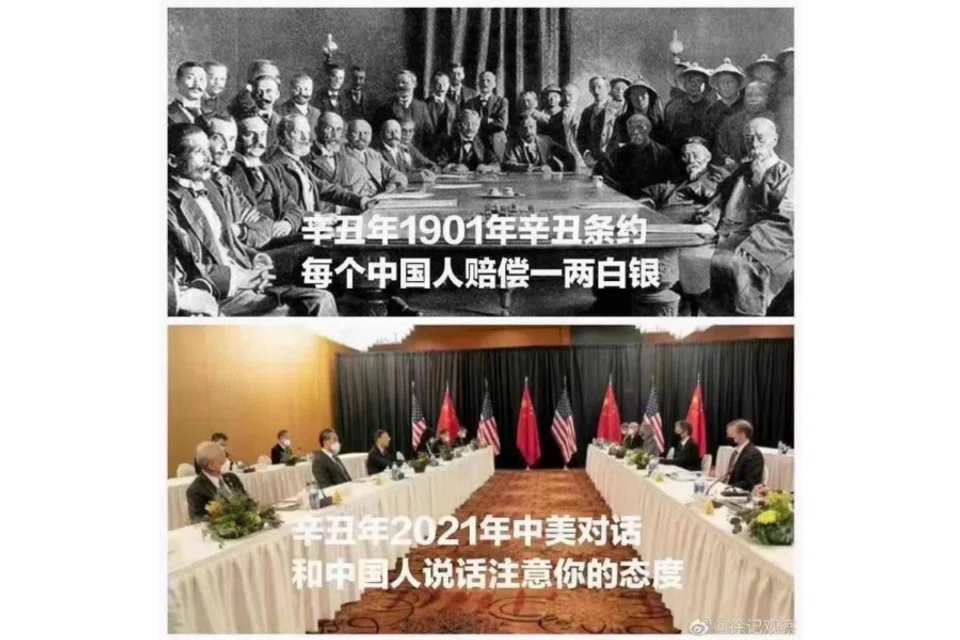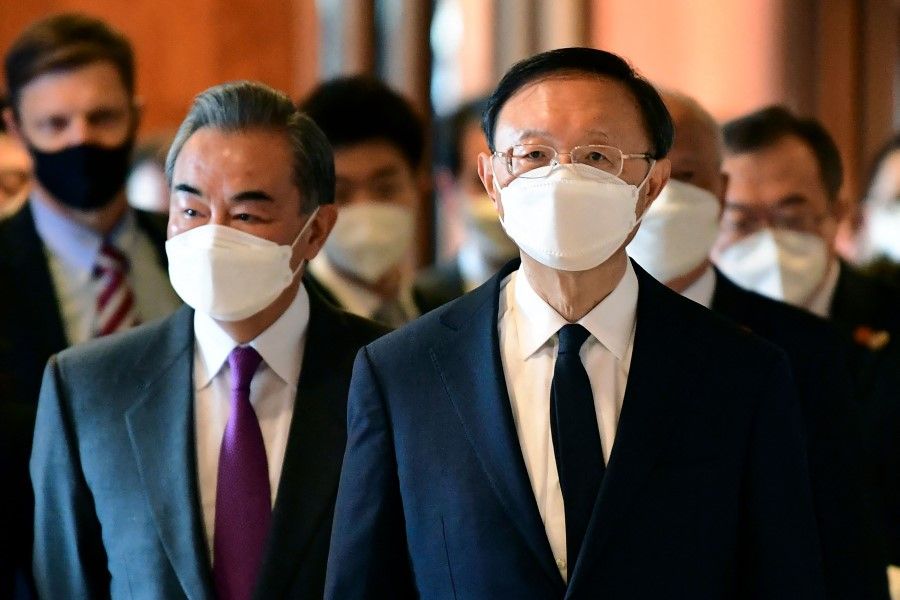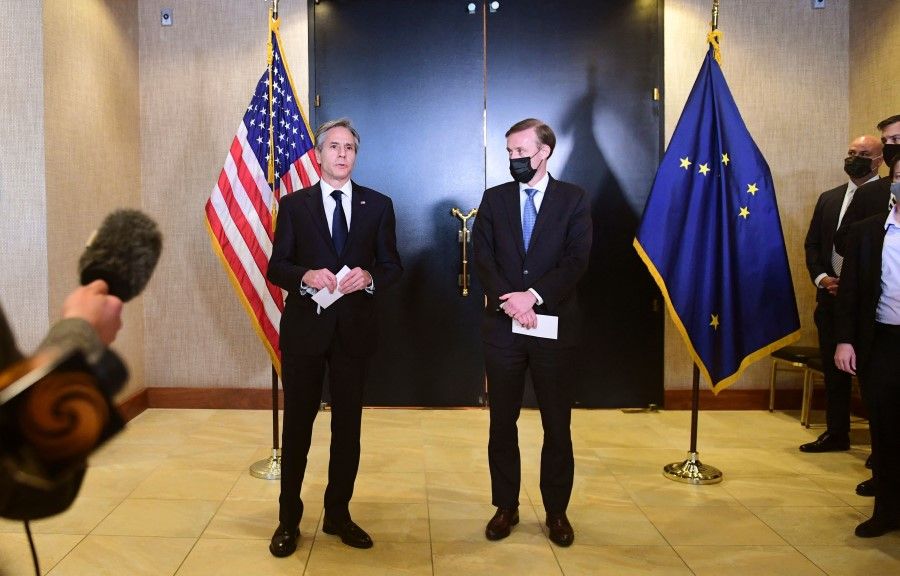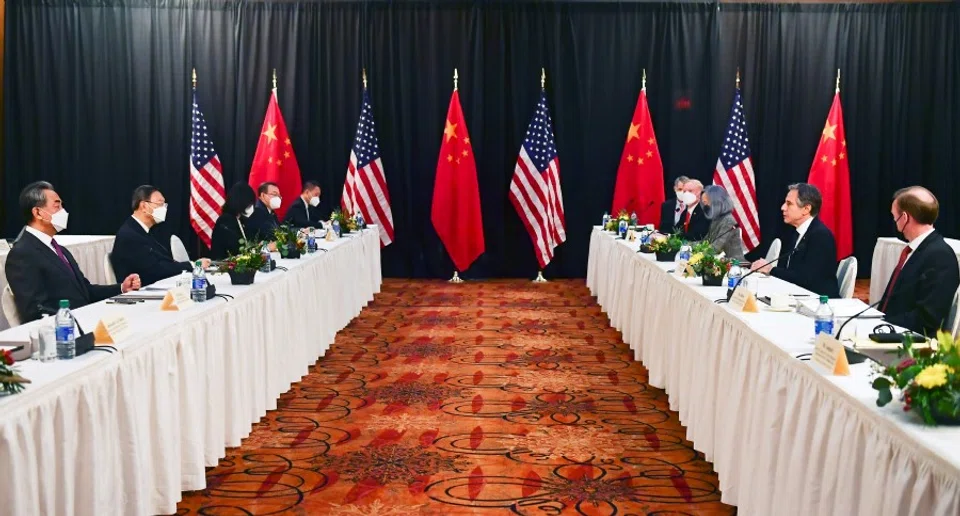Alaska meeting: A historic moment of China standing up to the West?

Following all the media hype, all that is left of the two-day Alaska high-level dialogue between China and the US is the intense exchange on the opening day - the dialogue itself seems to have closed without a conclusion.
But what many people overlook is that the opening remarks of any diplomatic meeting is usually a formality, an exchange for the benefit of the media, and not the actual meeting agenda. So, it is indeed rare that China and the US were going at each other right from the start.
Of course, this was not a case of both sides losing their cool at the spur of the moment, but a calculated move. From China's Politburo member and Director of the Office of the Central Commission for Foreign Affairs Yang Jiechi and State Councilor and Foreign Minister Wang Yi, to the US's Secretary of State Antony Blinken and national security adviser Jake Sullivan, all of them are diplomatic veterans who would not lose control in front of their opponents or the media.

Backing down not an option
But it is true that both sides did not follow the script on this dialogue that the world had its eye on. Because of the high pressure, neither side could afford to appear weak in front of their domestic audiences.
Before the meeting, the US took some measures targeted at China, including convening a virtual leader's summit of the Quad countries (US, Australia, India and Japan), showing its stance of strategic containment of China. Blinken did not hold back his comments during a House Foreign Affairs Committee hearing in mid-March: "Taiwan is a strong democracy, a very strong technological power, and a country that can contribute to the world, not just to its own people."
In China's view, the actions taken by the US are not just about containing China and interfering with its internal governance, but it also carries shades of humiliating Chinese senior officials, and so China has to retaliate.
On 16 March, Blinken and US Defence Secretary Lloyd Austin, together with Japan, issued a joint statement addressing the issues of Hong Kong, Xinjiang, Taiwan, and the South China Sea, and criticising China's actions: "We agreed on the recognition that China's behavior, where inconsistent with the existing international order, presents various challenges to the alliance and the international community." Also, the day before Yang and Wang left for Alaska, Blinken announced financial sanctions on 14 vice chairmen of China's National People's Congress Standing Committee.

In China's view, the actions taken by the US are not just about containing China and interfering with its internal governance, but it also carries shades of humiliating Chinese senior officials, and so China has to retaliate.
It seems the US is not fully cognisant of China's anger and what it is about to do. According to video clips, Blinken and Sullivan did not seriously go beyond their allotted time during the first round of their opening, but they said before the media that China's actions "threaten the rules-based order that maintains global stability", and that is why its actions in Xinjiang, Hong Kong, and Taiwan are "not merely internal matters".
This face-off in Alaska was "cathartic" for many Chinese netizens.
This drew a strong rebuttal from Yang, who let go with harsh remarks including: "So let me say here that, in front of the Chinese side, the United States does not have the qualification to say that it wants to speak to China from a position of strength."
This face-off in Alaska was "cathartic" for many Chinese netizens. The most popular meme in China over the past few days is a comparison of a meeting between Qing government representative Li Hongzhang and the Western powers in 1901, and this latest meeting in Alaska.

Substantive outcomes include cooperation on climate change
Numerous we-media gave a detailed account of the fiery exchange between China and the US and praised every one on the Chinese side, from the high-level representatives down to the interpreters, for standing up to the Americans. They declared this a historical moment and said that China would meet the US as an equal from now on. It seems that what was discussed after that does not matter anymore.
Actually, after China and the US openly traded angry words, they engaged in three long closed-door meetings. Chinese state media reported on the outcome of the meeting on 20 March, but it did not seem to attract much attention.
Xinhua News Agency reported that China and the US "conducted candid, in-depth and constructive communication on their respective domestic and foreign policies, China-US relations, and major international and regional issues of common concern". It added that both sides thought that the dialogue was "timely and helpful, and deepened mutual understanding".
These words are not exactly clichés. Based on state media reports, the main points that China presented to the US were that the ruling position of the Chinese Communist Party and the security of the system are "intangible red lines" that "must not be compromised"; China has no intention of interfering in the US's political system or challenging or replacing the US's position and influence; both sides can cooperate on the three most urgent tasks facing the world now - fighting against the Covid-19 pandemic, handling climate change, and driving global economic recovery; no compromise can be made on the Taiwan issue; the US should remove sanctions against Chinese officials and institutions, and stop its attempts at meddling in Hong Kong affairs; and while Xinjiang's doors are wide open to the world, China does not accept biased investigations based on "presumption of guilt".

In terms of the meeting's actual outcomes, a Xinhua report said that both sides shared the hope of continuing "such type of high-level strategic communication" and would establish a joint working group on climate change. It added that the US and China talked about "adjusting relevant travel and visa policies according to the epidemic situation", and "gradually promoting the normalisation of personnel exchanges" between the two countries. It continued that the officials also discussed various topics including "economy and trade, military, law enforcement, culture and people-to-people interactions, health, cyber-security, climate change, the Iranian nuclear issue, Afghanistan, the Korean Peninsula issue, and Myanmar", and that the two countries will "maintain and enhance communication and coordination on them".
Even if both sides did not trade angry words during the high-level meeting, the outcome of the dialogue may not have been any better.
On its part, the US is not completely disappointed with the meeting. Blinken told the media that China and the US are "fundamentally at odds" in a number of areas including Hong Kong and Xinjiang, and that it was no surprise that the US received a "defensive response" on those matters. He said that the US has shared with China "concerns shared by our allies and partners", and also clearly stated the US's "own policies, priorities, and worldview". Sullivan then said that the US "had the opportunity to lay out our priorities and intentions, and to hear from the Chinese side their priorities and intentions", and that they were "clear-eyed" coming in and coming out of the meeting. He added that the US would continue to "consult with allies and partners on the way forward... through the normal diplomatic channels" and also "continue to work with China going forward".
China-US relations have deteriorated over the past few years and it is no longer possible to return to the past. Even if both sides did not trade angry words during the high-level meeting, the outcome of the dialogue may not have been any better. But it is certainly better to speak with each other rather than confront each other. As long as both parties maintain communication, China-US relations will not slip into the abyss of a Cold War or even a hot war.
